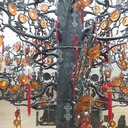Aspirin attenuates spontaneous recurrent seizures in the chronically epileptic mice.
关键词
抽象
OBJECTIVE
Neuroinflammatory processes are pathologic hallmarks of both experimental and human epilepsy, and could be implicated in the neuronal hyperexcitability. Aspirin represents one of the non-selective nonsteroidal anti-inflammatory drugs with fewer side effects in long-term application. This study was carried out to assess the anti-epileptic effects of aspirin when administered during the chronic stage of temporal lobe epilepsy [TLE] in mice. The alteration of hippocampal neurogenesis was also examined for raising a possible mechanism underlying the protective effect of anti-inflammatory treatment in the TLE.
METHODS
Two months after pilocarpine-induced status epilepticus, the chronically epileptic mice were treated with aspirin (20 mg, 60 mg or 80 mg/kg) once a day for 10 weeks. Spontaneous recurrent seizures were monitored by video camera for 2 weeks. To evaluate the profile of hippocampal neurogenesis, the newly generated cells in the dentate gyrus were labeled by the proliferation marker BrdU. The newborn neurons that extended axons to CA3 area were visualized by cholera toxin B subunit retrograde tracing.
RESULTS
Administration of aspirin with a dosage of 60 mg or 80 mg/kg initiated at 2 months after pilocarpine-induced status epilepticus significantly reduced the frequency and duration of spontaneous recurrent seizures. Aspirin treatment also increased the number of newborn neurons with anatomic integration through improving the survival of the newly generated cells.
CONCLUSIONS
Aspirin treatment during the chronic stage of TLE could attenuate the spontaneous recurrent seizures in mice. Promotion of hippocampal neurogenesis and inhibition of COX-PGE2 pathway might partly contribute to this anti-epileptic effect. Highlights • Aspirin attenuates spontaneous recurrent seizures of chronically epileptic mice • Aspirin increases neurogenesis of chronically epileptic hippocampus by improving the survival of newly generated cells • Promotion of hippocampal neurogenesis and inhibition of COX-PGE2 pathway might partly contribute to anti-epileptic effects of aspirin.




